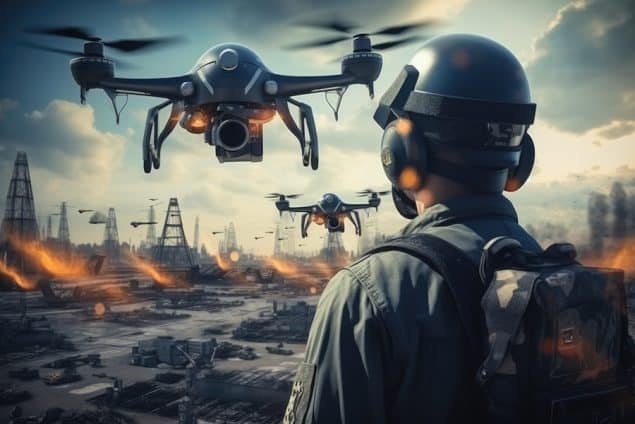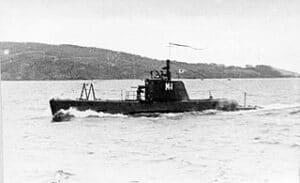Home » Spotlight • US business news » 10 Amazing Ways AI is Changing the U.S. Military
10 Amazing Ways AI is Changing the U.S. Military
https://www.whatjobs.com/news/what-news-topical/10-amazing-ways-ai-is-changing-the-u-s-military

By Hugh Fort in Spotlight, posted April 4, 2024

Artificial intelligence (AI) has become a vital part of the modernization and enhancement of the capabilities of the U.S. Military.
From autonomous vehicles patrolling conflict zones to advanced cyber defense mechanisms, AI is at the forefront of revolutionary changes in military operations.
These advancements not only promise to increase efficiency and accuracy but also aim to save lives by reducing the need for soldiers in dangerous situations.
Here are 10 amazing ways AI is reshaping the U.S. Military, highlighting its growing significance in national defense strategies.
Autonomous Vehicles and Drones
AI-driven autonomous vehicles and drones are transforming the military's reconnaissance and surveillance operations.
These unmanned systems can navigate challenging terrains and gather critical intelligence.
They can even even execute precise strikes with minimal human oversight.
Using AI means the military is able to enhance its operational efficiency while significantly reducing the risk to human life.
This technology enables 24/7 monitoring capabilities across the globe, ensuring swift responses to emerging threats.
Cybersecurity
In 2024, cyber threats are a constant threat to security, and the U.S. Military relies on AI to bolster its cybersecurity defenses.
AI algorithms are used to identify patterns and anomalies that give clues over potential cyber attacks.
This enables the military to preemptively counteract potential breaches.
This proactive approach ensures the protection of sensitive information, maintaining the integrity of national security operations.
Predictive Maintenance
AI's predictive analytics are revolutionizing the military's approach to equipment maintenance.
By analyzing data from various sensors, AI can now forecast when vehicles, aircraft, or weaponry are likely to need fixing.
This means the military is able to minimize downtime, extend the life of critical equipment, and ensure readiness for unforeseen missions.
It also saves money.
Logistics and Supply Chain Optimization
AI significantly enhances logistical efficiency within the military.
What this means is that the AI can analyze a massive amount of data.
Because of this, it can optimize supply chain operations, from inventory management to the strategic deployment of resources.
This ensures that troops are well-equipped and materials are delivered safely and efficiently, even in complex operational theatres.
Facial Recognition and Surveillance
AI-powered facial recognition technology is crucialin enhancing security measures.
it is used in surveillance systems on military bases and in operational zones.
It helps to identify people of interest and assess potential threats.
The technology offers a layer of security that is both hi-tech and non-invasive.
This contributes to the overall safety of military personnel and installations.
AI in Warfare Strategy
AI plays a crucial role in modern warfare strategy through highly realistic simulations.
These simulations allow military strategists to create conflict scenarios, predict the outcomes, and develop effective tactics.
This not only helps decision-making but also prepares soldiers for a range of possible scenarios they might face on the battlefield.
Need Career Advice? Get employment skills advice at all levels of your career
Language Translation and Communication
AI-driven language translation tools are breaking down communication barriers in international military operations.
This technology is able to facilitate instant communication between allied forces and local populations, enhancing collaboration and operational effectiveness.
It's a vital tool in peacekeeping missions, particularly in tense situations, and when navigating the complexities of international diplomacy.
Wearable Tech
Integrating AI into wearable technology offers real-time monitoring of soldiers' health and performance metrics.
This can include vital signs, fatigue levels, and even stress markers.
This can provide crucial research to enhance soldier welfare, reduce injuries, and optimize performance in the field.
Intelligence Analysis
AI's ability to rapidly analyze vast datasets is invaluable in intelligence operations.
It sifts through communications, images, and other forms of data to identify threats, track enemy movements, and inform strategic decisions.
This capability significantly accelerates the intelligence cycle, providing timely and actionable insights.
Training and Education
AI-powered virtual and augmented reality systems are revolutionizing military training programs.
These immersive technologies simulate realistic combat scenarios, allowing soldiers to hone their skills in safe but challenging environments.
This method of training is cost-effective, scalable, and can be tailored to mimic a wide array of operational situations.
As the U.S. Military continues to innovate, the role of AI will undoubtedly expand, promising a new era of efficiency, safety, and effectiveness in national defense.
Follow us on YouTube, X, LinkedIn, and Facebook














